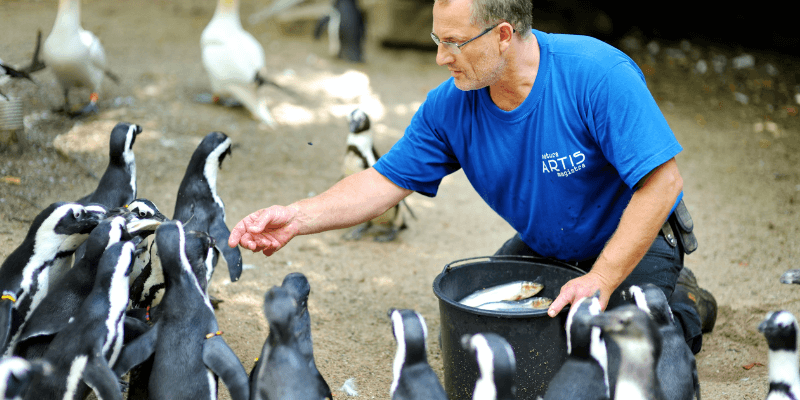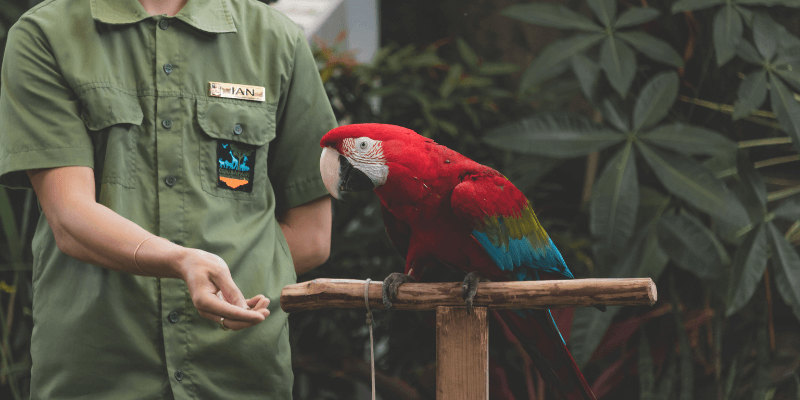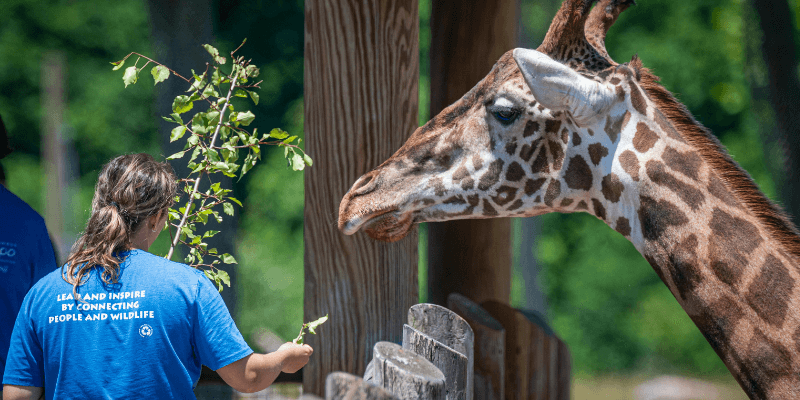5th August 25
Zookeeping is a career that combines a love for animals with a passion for education, conservation, and hands-on work. It’s a popular role for those who dream of working closely with wildlife, but it’s not just about cuddling animals or feeding exotic creatures. Becoming a zookeeper requires dedication, specialist training, and a strong understanding of animal care and behaviour.
In this guide, we’ll explore how to become a zookeeper in the UK, what qualifications you need, and what the job really involves.
What does a zookeeper do?
A zookeeper is a crucial member within a zoo framework as they have a range of responsibilities. While a zookeeper job description can be broad, the primary focus is to care for animals of varying species. From penguins and tropical birds to lions and tigers, you could be responsible for providing them with the best environment to live and thrive comfortably.
As part of your role as a zookeeper, you may be required to engage with the public, explaining the conservation efforts of the zoo and educating visitors on the history of the animals. So, what is it like to be a zookeeper? A breakdown of the usual responsibilities of a zookeeper are as follows:
- Keep areas clean for the animal
- Observe the animals for signs of illness or distress
- Prepare food for the animals
- Design environments for animals that match their natural habitats
- Work closely with veterinary professionals
- Help with raising young animals
- Keep daily records of animal behaviour and feeding habits
It’s a physically demanding job that often involves working outdoors in all weather conditions, including weekends and holidays. But for those passionate about animals and conservation, it can be an incredibly rewarding career.

Top 5 reasons to become a zookeeper
While there are many, the below are arguably the 5 best reasons to become a zookeeper.
1. Work closely with wild animals
Daily interaction with animals is one of the most appealing parts of being a zookeeper. From feeding and cleaning to monitoring behaviour and health, you’ll build meaningful bonds with the animals in your care, all while helping to replicate their natural environments and ensuring their wellbeing.
2. Make a tangible impact on animal welfare
Zookeepers play a hands-on role in protecting endangered species and supporting animals that may not survive in the wild due to injury or illness. Your close observations and care contribute directly to their health, safety, and overall quality of life.
3. Educate and inspire the public
Zookeepers are also educators. By sharing your knowledge with visitors, you’ll raise awareness about animal behaviour, habitats, and conservation needs. All of this helps to inspire others to care more deeply about wildlife and the environment.
4. Support the growth of young animals
Many zoos run specialist breeding programmes. As a zookeeper, you'll help raise young animals, ensuring they're nurtured properly in safe, enriched environments. It’s a unique and rewarding opportunity to be part of a new life journey from day one.
5. Contribute to global conservation efforts
Modern zoos focus heavily on conservation through practice, advocacy, and research. Zookeepers help implement breeding and rehabilitation programmes, support fundraising efforts, and contribute to scientific studies on animal welfare and sustainability, playing an essential role in protecting the planet’s biodiversity.
How to become a zookeeper
You may be asking what qualifications do you need to be a zookeeper. UK learners should know that it is not a prerequisite to have a qualification to work in a zoo, but it is unlikely that you will get a role as a zookeeper without prior experience and study.
While there’s no single route into zookeeping, the most common pathway involves gaining relevant qualifications, experience, and specialist knowledge.
1. Get qualified
While it’s possible to enter the profession through experience alone, many zoos prefer candidates with a formal qualification in animal care or zoology. Popular qualification routes include:
- Level 3 Diploma in Animal Management
- Foundation Degree or BSc in Zoology, Animal Science or Animal Behaviour
- Zookeeping-specific certifications, such as our online Level 3 Diploma in Zookeeping, or a Wildlife Conservation Course
These courses typically cover animal health, husbandry, behaviour, biology, and enrichment practices, giving you a solid foundation for zookeeping work.
While not always essential, additional certifications – like those focused on conservation, endangered species, or zoo operations – can make your CV more attractive to employers.
Some zookeepers also pursue first aid training (for both animals and humans), a driving licence (for working across large sites), and manual handling qualifications.

2. Gain hands-on experience
Experience is crucial. Most zoos expect applicants to have worked directly with animals, even if in a voluntary capacity. Start by volunteering at animal shelters, farms, wildlife rescue centres, or your local zoo. This not only shows your commitment but also helps you develop practical skills in handling, feeding, and caring for animals.
Keep in mind that zookeeper roles are competitive. The more hands-on experience you have, the more you’ll stand out.
3. Build your skills and knowledge
Zookeepers need more than just a love for animals. You’ll also need strong observation skills, the ability to follow protocols, and good communication abilities, especially when working in teams or interacting with the public.
Understanding animal behaviour, welfare standards, and health indicators is essential. Many zookeepers also need to be comfortable using technology to monitor animals, keep records, and manage feeding or breeding plans.
If you're interested in progression, developing leadership, research, or conservation skills can open doors to more senior or specialised roles.
Where can zookeepers work?
Zookeepers aren’t limited to traditional zoos. Qualified professionals can find work in a variety of settings, such as:
- Wildlife and safari parks
- Aquariums
- Animal rescue and rehabilitation centres
- Conservation and research projects
- Petting farms and educational animal parks
Some zookeepers also move into international conservation work or relocate to animal centres abroad.
Career progression and specialisation
Zookeeping is a varied and evolving field. With experience, you could move into a senior keeper position, specialise in caring for specific animals (like primates, reptiles, or birds), or take on roles in zoo education, animal training, or veterinary assistance.
Further qualifications or training can also help you move into zoo management, conservation project leadership, or research-based positions.
Is zookeeping right for you?
Zookeeping isn’t just a job – it’s a lifestyle. You’ll need to be physically fit, emotionally resilient, and passionate about animal welfare. It can be dirty, demanding, and sometimes stressful, but it’s also deeply fulfilling for those who thrive in hands-on, meaningful work with animals.
If you’re fascinated by animal behaviour and committed to conservation, zookeeping could be the perfect path for you.
Benefits of studying zookeeping online
There is no doubt that the practical element of a zookeeping course is crucial as it gives you real-life experience of working in a zoo. By coupling that with online learning, you get an all-around learning experience from these zookeeper qualifications, not to mention the convenience of studying online. As one of the UK’s leading online learning providers, learndirect has helped more than 4 million students achieve qualifications in multiple disciplines.
With most courses being online, you have the freedom to study at your own pace and from anywhere in the world! All you need is a stable internet connection, a laptop or computer, and you’re good to go! Online zookeeping courses are ideal for individuals who have existing commitments, such as looking after young children or working full-time.
You can tailor your learning journey to suit your daily life, meaning that you don’t have to neglect your commitments. As soon as you enrol, you will be sent the course materials you need to complete the Zookeeping Level 3 Diploma (RQF) and gain your zookeeper qualifications. So, as soon as they come through, you can get started! The dates for your practical training will be provided once you begin the course.
Start your zookeeping journey
If you're ready to take the first step toward a career in animal care, learndirect offers a range of online animal courses to help you gain the qualifications and confidence you need. From animal management to zookeeping and wildlife conservation, our flexible learning options fit around your life and help you turn your passion into a career.
Find out more about the Zookeeping Level 3 Diploma (RQF) by getting in touch today or browsing it on our website. Alternatively, if you’re ready to start a rewarding animal career but don’t know which path to take, click the link to download our FREE animal course brochure below and find the course that suits your goal.




















